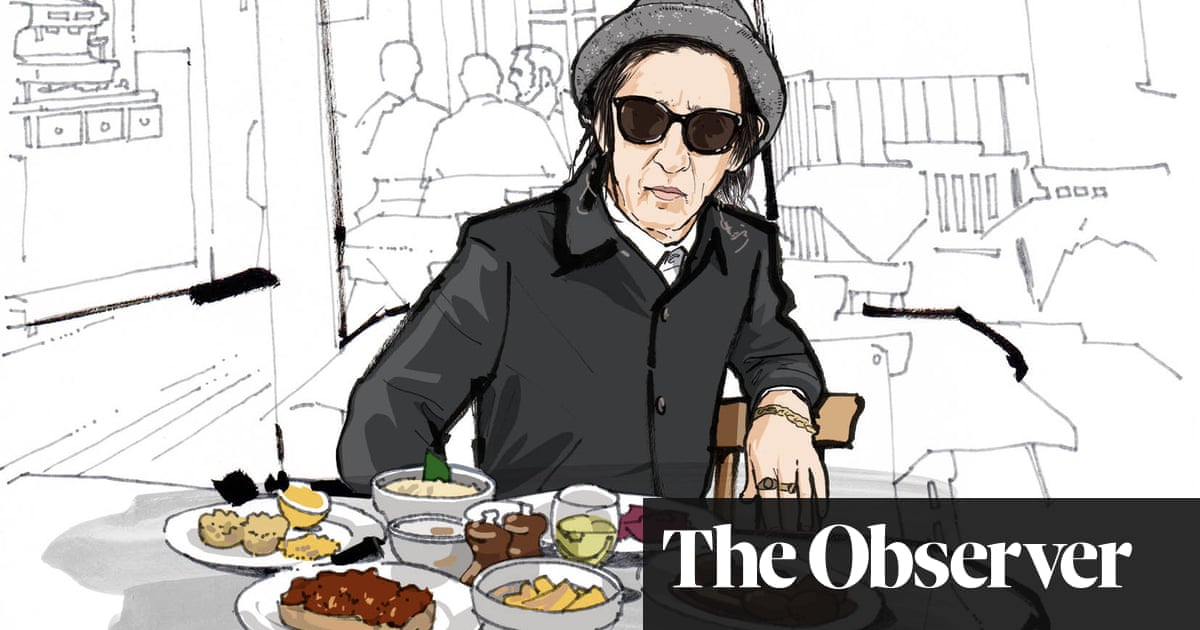
Show caption John Cooper Clarke at St John: ‘The thing about that mod look is you can keep it all your life.’ Illustration: Lyndon Hayes/The Observer Lunch with… John Cooper Clarke: ‘There’s three food groups I draw the line at – flapjack, falafel and tripe’ The poet relates tales of his childhood, run-ins with Bernard Manning – and explains why he wishes Ken Loach would lighten up Tim Adams @TimAdamsWrites Sun 19 Sep 2021 12.00 BST Share on Facebook
Share on Twitter
Share via Email
Dr John Cooper Clarke, Salford’s favourite son, arrives in the whitewashed upper room of St John near London’s Smithfield meat market trailing a suitcase. He’s met the fish man on the way in who, like him, has travelled up from Essex this morning, so he can vouch for the freshness of the oysters. Clarke’s come from an appointment with his tailor, though you can’t imagine his sartorial instructions have changed much in the half century in which he has evolved from strung-out punk poet to alternative national treasure: drainpipe kecks, jacket with lapels as skinny as he is, ditto: tie, boots with a bit of a heel, hair with a varied and interesting life of its own, and shades. Today is no different. “The thing about that mod look is you can keep it all your life,” he says, from the survivor’s vantage of 72. “As long as you maintain your silhouette, as I have endeavoured to do.”
Clarke’s recent memoir, I Wanna Be Yours, provides, along with many other vivid pleasures, a window on the changing influences on British youth culture from Tony Curtis onwards. “There’s a solid tradition of working-class people dressing up at the weekend for a big night out,” he says. “Whereas the salaried classes might put a cardigan on and mow the lawn.” He starts off his memoir suggesting that its aim is to “fleetingly call up events that best illustrate the flavour of my existence,” but his recollections are far more precise than that suggests.
I’m thinking: this is the Observer. I don’t want to kiss the vegan chick demographic goodbye
“People always assume that anybody who’s ever had anything to do with narcotics has a faulty memory. You know: ‘If you could remember the 60s you weren’t really there.’ I think that’s bollocks. I can remember all of it. I sometimes wish I couldn’t.”
He studies the St John menu, which might have been written for a London chophouse in 1740 and keeps up a commentary while he does so. “There are only three food groups I draw the line at,” he says. “Flapjack, falafel and tripe. Flapjack is just hippy cake. Loads of sugar, but still ultimately nasty. I’ve given falafel too many chances to come good. And tripe, say no more.” He’s a regular here, but suddenly troubled by the carnivorous options on offer. “I’m thinking: this is the Observer. I don’t want to kiss the vegan chick demographic goodbye.” To me: “Tell your readers I’m having the celeriac salad.” To the waiter: “I’m going to go smoked eel starter and devilled kidneys on toast.”
Though he’s long since got himself clean of harder narcotics he still likes a glass of wine. “I’ve got to go white in the daytime otherwise I’ll fall asleep,” he says. He chooses a Picpoul, in part, I think, because he enjoys what his Mancunian vowels can do with the word. “With whites my feeling is, always look to the cheaper end, there’s no real complexity. It’s just a refreshing drink.”
He’s grateful to lockdown for having given him time off from his never-ending tour dates to get the book written. But he’s glad it’s over. “You know me, I’m Mr Gregarious. I’m a neighbourhood guy.” He knew for sure that “normal” had returned on a trip up to Old Trafford for the first day of the football season. He’s become something of a resident poet at Man Utd, where he first used to go with his old man. “I did some gig for Adidas, and I said: ‘How about getting me and my missus in for a nosh up in the executive box?’ It worked. And we beat Leeds 5-1. Pure magic. Though I had to inform Evie it wasn’t always like that.”
That trip up to Manchester was a chance to once again tour his French wife of 30 years around his formative haunts. The book does a magical job of capturing the time and place of his growing up in a high-ceilinged flat carved out of what was once an Italianate villa – “slums to anyone who didn’t live in them” – beside the junction of two of Manchester’s busiest roads. It was a tough place, but clearly in his eyes, I suggest, full of a certain urban glamour?
“I’m glad that comes across,” he says, “because I didn’t have a cloth cap kind of childhood. We were solidly working class, but it was a very cosmopolitan corner, mainly because it was a very Jewish area. So, you know, there were neighbours that had contacts all over, Chicago or wherever.” There was no TV until he was 10, but there were seven cinemas within walking distance. “If you took three pop bottles back to the shop for the deposit that was enough to get you into a movie for an afternoon.”
From the age of 13, when he was working as a bookie’s runner around the pubs, it was his ambition to be a working poet, though as he says, “The life of a useless flaneur was not encouraged in the 1950s… [and] a generous stipend was out of the question.” If there was a turning point in his career, it was when he first persuaded Bernard Manning to give him a spot as a compere at Manchester’s Embassy club. “Bernard had no equivalent outside of his neighbourhood,” he says. “He’d often pick up the bills for funerals and threaten to break the legs of the undertaker if he divulged the good deed. It was in his interest to be a hate figure.” When he went to audition for Manning, with his sheaf of poetry, he hardly got through the door. “They don’t like poetry here, son, half of them can’t read.” Before he got the bum’s rush Clarke read for Manning his verse Salome Maloney about a girls’ night out at the city’s Mecca dancehall. “I knew he’d fall for that couplet: ‘When the ambulances came, she was laying on the deck / She fell off her stiletto heels and broke her fucking neck,’” Clarke says. “Bernard knew the Mecca and, as we know, he liked the liberal use of that kind of language, so he gave me a go.”
John ate smoked eel, pickled red cabbage and horseradish £14.20, devilled kidneys on toast £19.80, ginger loaf and butterscotch sauce £8.70. Tim ate Deep-fried skate cheeks with aioli £10.80, beef mince on dripping toast £20.80, potatoes £5.50, madeleines £5.50. They drank St John Picpoul De Pinet 2019 Les Costières De Pomerols, Languedoc £30. Photograph: Sophia Evans/The Observer
After the working men’s clubs the crowds gobbing on him at punk gigs – he supported the Sex Pistols among others – were a doddle. Since then, and after he recovered from heroin addiction in the 1980s, his unmissable solo act has developed a far more conversational tone, full of mordant digression. It is the closest British live entertainment comes these days to the great music hall acts of the past.
“It’s wrong to think that poetry was never show business,” he says. “They all did monologues right up to Stanley Holloway.” He’s justly proud that some of his stuff is on the GCSE syllabus now; it was his teacher at his secondary modern who first sparked a lifelong love of language. Education was always revered. “There was one guy in our entire area that went to university,” he says. “And that was my very sadly recently departed cousin Sid, who studied Russian. When he got in it was like the coronation.” In his own case, he says, he always found ways “to thrive primarily on serial discouragement, and a sense of: this gets me that. I was staying in Belgravia, a couple of years ago, standing outside my hotel having a smoke and a hackney carriage screeched to a halt and the cabbie jumped out to shake my hand: ‘John Cooper Clarke: my favourite poet!’ Nobody could say I haven’t put the hours in. But you can’t buy that feeling.”
His memoir is honest both about the initial seductions of his drug habit and its near-fatal destructiveness. It was, in the end, meeting Evie that saved his life, got him straight. They settled not far from Colchester, and had a daughter, Stella, the joy of his life. Reading his story, I say, I was reminded of one of those medieval romances, where the reckless hero, Troilus or whoever, makes all kinds of disastrous choices, before finding a way to tell the tale (admittedly usually postmortem).
“We’ve always all liked a happy ending,” he says. “That’s why I hate Ken fucking Loach. Why can’t you leave us, just once, with a smile, Ken?” Putting his devilled kidneys aside for a moment, he goes into a monologue about the importance of comedy, of storytelling in creating civilisation, an argument that eventually takes in the tragic deaths in the past week of his friend Sean Lock – (“the funniest guy anywhere”) – and two of his abiding heroes, Don Everly and Charlie Watts. “Still, despite everything,” he concludes, “there has never been a better time to be alive. People say: ‘John, prove that to me.’ And there’s only one statistic you need: life expectancy. Who can argue with it?” He eyes the empty wine bottle. “Let’s get another one,” he says, “while we can.”
I Wanna Be Yours (Picador, £9.99) and poetry collection The Luckiest Guy Alive (Picador, £10.99) are out now in paperback. To support the Guardian and Observer order your copies from guardianbookshop.com. Delivery charges may apply






